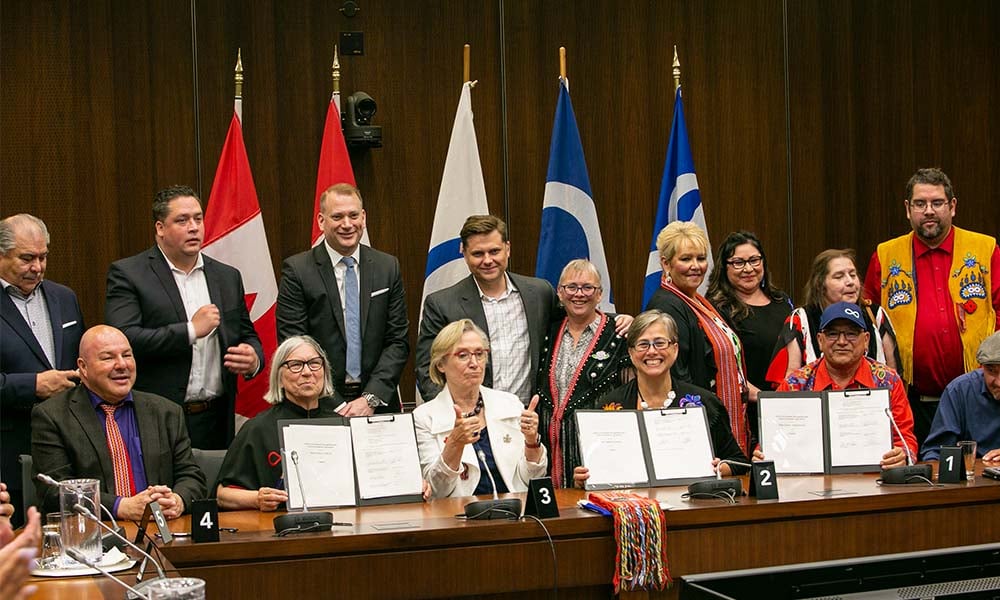'First-of-its-kind conference comes year after signing of Métis self-government agreements

Métis governments from Alberta, Saskatchewan and Ontario are meeting in Ottawa for a national conference on Métis self-government on Monday and Tuesday.
The conference will include Métis leaders, government officials, lawyers, academics and First Nations with experience negotiating modern-day treaties and self- government agreements. The three Métis governments collectively represent more than 200,000 people.
In an announcement, Métis Nation-Saskatchewan called the conference a “first of its kind.” The gathering comes nearly a year after the Government of Canada signed self-government agreements with the three Métis nations. The accords affirmed Métis right of self-government and recognized Métis jurisdiction over core areas of governance, such as citizenship, leadership selection and government operations. The agreement also established processes for negotiating future agreements over additional areas of jurisdiction and set out “next steps” for formal recognition of “Métis governments as Indigenous governments in Canadian law,” the government said at the time.
“These historic agreements will transform Canada’s relationship with these representative Métis governing bodies by formally recognizing them as Indigenous governments,” a spokesperson from Crown Indigenous Relations and Northern Affairs Canada told Canadian Lawyer. “Before the agreements can take effect, certain steps must be completed, including transition work and enabling legislation.”
This week’s conference and the 2019 agreements represent the emergence by the Métis from the “legal lacuna” in which they have existed since confederation, says Métis-rights lawyer Jason Madden, who is speaking at the conference.
“As [then] Chief Justice Lamer said in the Delgamuukw case 20 years ago, ‘let’s face it, we’re all here to stay,’ The discussion needs to be: How do we reconcile our respective jurisdictions and rights within Canada?” Madden says. “So I think the conference is quite a milestone for Métis in particular because this has been such a long time coming.”
Madden, who is co-managing partner of Pape Salter Teillet LLP in Toronto, says three Supreme Court of Canada decisions – which he detailed in a 2018 opinion column for Canadian Lawyer – paved the way for the 2019 agreements.
The 2003 Supreme Court of Canada decision R. v. Powley, 2003 SCC 43 confirmed that Métis rights were protected as existing Aboriginal rights, within the meaning of s. 35 of the Constitution Act, 1982, which states: “The existing aboriginal and treaty rights of the aboriginal peoples of Canada are hereby recognized and affirmed.” The 2013 SCC case Manitoba Metis Federation Inc. v. Canada confirmed that by not following through on their promise of providing 1.4 million acres of land to the Manitoba Métis under their 1869/1870 deal, Canada had breached the honour of the Crown. And in 2016, the SCC confirmed the Métis are “Indians” as defined under s. 91(24) of the Constitution Act, 1867, in Daniels v. Canada. Section 91(24) grants Parliament “exclusive legislative authority” over “Indians, and Lands reserved for the Indians.”
“This means that Canada has always had constitutional jurisdiction to establish nation-to-nation, government-to-government relationships with the Métis in the same way as it has with First Nations and Inuit,” Madden wrote.
Within the 2019 agreements there is an express provision that the Government of Canada will introduce legislation to give legislative effect to their substance, says Tom Isaac, who will also speak at the conference and is chair of Cassels Brock & Blackwell LLP’s Aboriginal law group. Action from Ottawa is expected imminent, Isaac says. “We expect that to happen later this year.”
Isaac was Ministerial Special Representative on Métis s. 35 Rights and, in 2016, delivered his report: A Matter of National and Constitutional Import: Report of the Minister’s Special Representative on Reconciliation with Métis: Section 35 Métis Rights and the Manitoba Metis Federation Decision.
Also speaking at the conference is Marilyn Poitras, director of the University of Saskatchewan’s Indigenous Law Centre. Poitras has wide experience working on self-government negotiations and agreements with Indigenous groups, including with the Gwich'in and Inuvialuit self-government agreement for the Northwest Territories’ Beaufort-Delta Region and for the Federation of Saskatchewan Indian Nations. Though making significant gains in recognition now, Poitras notes Métis governing structures have existed since before confederation.
“There's been little to no financial resources for any of these governing structures for the last several decades and so they're now organizing, figuring out membership, looking at election data in a much larger systemic way.”
“This is a legitimization of nationhood. It's full participation,” she says.










